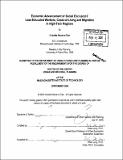Economic advancement or social exclusion? : less-educated workers, cost-of-living and migration in high-tech regions
Author(s)
Navarro Díaz, Criseida
DownloadFull printable version (17.98Mb)
Other Contributors
Massachusetts Institute of Technology. Dept. of Urban Studies and Planning.
Advisor
Frank Levy.
Terms of use
Metadata
Show full item recordAbstract
Several high-tech regions today show signs of displacement and exclusion of low-skill workers from the employment and wage benefits of a booming economy. Whether high-tech activities are responsible for these trends or if the ex ante characteristics of the region could predispose its residents to exclusion, in the absence of high-tech growth, are issues that regional scientists have left largely unexplored. Understanding what low-skill and high-skill workers undergo in the presence of this activity, and how that compares to the reality of those who reside in regions whose economy is not dependent on knowledge-intensive sectors, provides a backdrop for policy makers to evaluate industry-choice decisions in the interest of economic growth and social equity in regional development. To provide that backdrop, I empirically answer: How are the benefits of high-tech development distributed between less- and more-educated workers? How does this distribution compare to that of regions that do not follow an education-intensive development path? Are social equity and sustained growth possible under these conditions? Through regression analysis across 50 regions in the United States during the 1990s, I show that shifts in regional economic-base composition towards a greater concentration of high-tech activity cannot be held on its own responsible for exclusionary patterns in these regions. (cont.) As high-tech activity increases in a region it attracts workers of all skill levels, causing employment upsurges that are more substantial for college graduates than for high-school graduates. This shift in economic-base composition yields wage drops for low-skill workers but only when migration and cost-of-living are taken into consideration. Conversely, shifts in the composition of the region's workforce towards a more-educated labor pool resulting from migration flows lead to an employment-growth shrinkage for all skill groups, this adverse effect in supply being stronger on high-skill labor than on low-skill labor. As the proportion of college graduates increases, it deters high-skill workers from entering the region, slowing down growth in their supply, their wages, and overall growth in an economy based in this input. Once cost-of-living and migration are taken into consideration, an increase in this proportion yields wage drops for high-school graduates and a small wage gain in college graduate wages, causing greater wage inequality between more- and less-educated workers and more- and less-educated regions.
Description
Thesis (Ph. D.)--Massachusetts Institute of Technology, Dept. of Urban Studies and Planning, 2005. Includes bibliographical references (leaves 191-194).
Date issued
2005Department
Massachusetts Institute of Technology. Department of Urban Studies and PlanningPublisher
Massachusetts Institute of Technology
Keywords
Urban Studies and Planning.